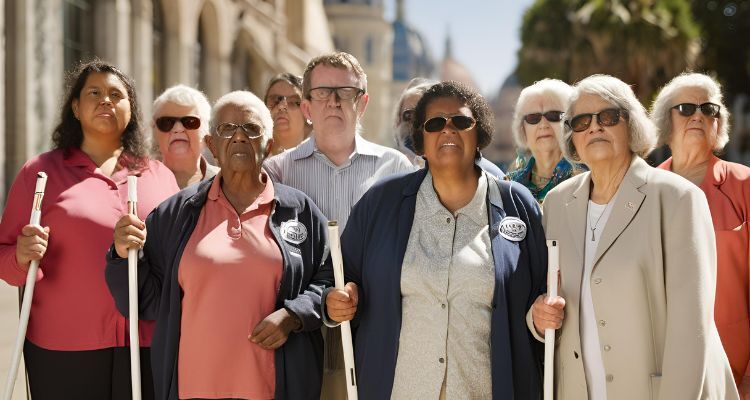
National Federation of the Blind (NFB): Empowering Blind Americans Since 1940
The National Federation of the Blind (NFB) is a groundbreaking organization dedicated to improving the lives of blind people in the United States. Established in 1940, the NFB has grown to become the largest and most influential organization of blind individuals in the country. The organization’s mission is to ensure that blind people have equal access to opportunities and the ability to live independent, fulfilling lives. Through advocacy, education, research, and technology, the NFB works to break down barriers and change public perceptions about blindness.
The Genesis of the National Federation of the Blind
Founding and Early Years
The National Federation of the Blind was founded in 1940 by a group of dedicated and visionary individuals who recognized the need for a unified national organization to advocate for the rights of blind people. At the time, blind individuals were often marginalized and excluded from many aspects of society. The founding members of the NFB sought to change this by creating an organization that would empower blind people to advocate for themselves and work collectively to achieve equal rights and opportunities.
Growth and Expansion in the Mid-20th Century
In its early years, the NFB faced significant challenges, including societal prejudices and limited resources. However, the organization quickly grew in size and influence, attracting members from across the country who were eager to participate in its mission. The NFB's early successes in advocating for blind people's rights helped establish its reputation as a powerful and effective organization. By the mid-20th century, the NFB had become a leading voice in the disability rights movement, advocating for legislation and policies that would benefit blind individuals.
Key Milestones in Advocacy and Legislation
Throughout its history, the NFB has been at the forefront of numerous advocacy efforts and legislative battles. Some of the most significant milestones include the passage of the Randolph-Sheppard Act, which provides employment opportunities for blind individuals in federal buildings, and the Americans with Disabilities Act (ADA), which prohibits discrimination against individuals with disabilities. The NFB has also been instrumental in advocating for accessible technology, ensuring that blind people have access to the tools and resources they need to succeed in today's digital world.
Evolution of NFB’s Mission and Vision
As the NFB has grown and evolved, so too has its mission and vision. While the organization's original focus was on advocating for the rights of blind individuals, its mission has expanded to include education, research, and technology. Today, the NFB is committed to ensuring that blind people have equal access to opportunities and can live independent, fulfilling lives. The organization's vision is one of empowerment, where blind individuals are fully integrated into society and are able to participate in all aspects of life.
NFB’s Mission and Core Values
Advocacy for Equal Rights and Opportunities
At the heart of the NFB's mission is the advocacy for equal rights and opportunities for blind individuals. The organization works tirelessly to eliminate barriers that prevent blind people from fully participating in society. This includes advocating for accessible education, employment opportunities, and public transportation. The NFB also works to change public perceptions of blindness, challenging stereotypes and promoting a more inclusive and equitable society.
Promotion of Independence and Self-Sufficiency
The NFB is deeply committed to promoting independence and self-sufficiency among blind individuals. The organization believes that with the right tools, training, and support, blind people can lead independent and fulfilling lives. To this end, the NFB offers a variety of programs and resources designed to help blind individuals develop the skills and confidence they need to succeed. This includes everything from Braille literacy programs to job training and placement services.
Emphasis on Education and Training
Education is a key focus of the NFB's work. The organization believes that education is the foundation of independence and success for blind individuals. The NFB offers a range of educational programs, including the NFB BELL Academy, which provides Braille instruction and other skills training to blind children. The organization also offers scholarships to blind students pursuing higher education and provides resources and support to educators working with blind students.
Commitment to Innovation and Technology
The NFB is a leader in promoting innovation and technology that benefits blind individuals. The organization works closely with technology companies to develop accessible products and services, and it advocates for the adoption of inclusive design practices. The NFB's commitment to technology is evident in its various initiatives, such as the development of screen readers and other assistive technologies that make it easier for blind people to access information and communicate with others.
Key Programs and Initiatives of the NFB
NFB-NEWSLINE®: Accessible News Service for the Blind
One of the NFB’s most successful programs is NFB-NEWSLINE®, a free audio news service for blind and print-disabled individuals. Launched in 1995, NFB-NEWSLINE® provides access to hundreds of newspapers, magazines, and other publications, allowing blind people to stay informed and engaged with the world around them. The service is available 24/7 and can be accessed by phone, computer, or mobile device.
NFB-NEWSLINE® offers a wide range of content, from national and local news to entertainment, sports, and weather updates. The service also includes job listings, retail ads, and other practical information. For many blind people, NFB-NEWSLINE® is a vital resource for staying connected and informed.
The NFB BELL Academy: Educational Programs for Blind Children
The NFB BELL (Braille Enrichment for Literacy and Learning) Academy is another important initiative of the NFB. This program provides educational opportunities for blind children, focusing on Braille literacy and other essential skills. The NFB BELL Academy offers summer programs, weekend workshops, and other events designed to help blind children build their confidence, independence, and literacy skills.
Braille literacy is a key focus of the NFB BELL Academy, as the NFB believes that Braille is an essential tool for blind people to achieve academic and professional success. The program provides hands-on instruction in Braille, as well as activities and games that make learning fun and engaging.
The NFB National Convention
The NFB National Convention is the largest gathering of blind people in the United States and is held annually in different cities across the country. The convention brings together thousands of NFB members, allies, and supporters for a week of networking, learning, and advocacy. The event features a wide range of activities, including workshops, presentations, and exhibits, as well as social events and networking opportunities.
The NFB National Convention is a unique opportunity for blind people to connect with one another, share their experiences, and learn about the latest developments in technology, advocacy, and education. The convention also serves as a platform for the NFB to set its policy agenda and to mobilize its members around key issues.
Advocacy and Legislative Efforts
Advocacy is at the heart of the NFB’s work, and the organization is deeply involved in advocating for policies and legislation that promote the rights and inclusion of blind people. The NFB works on a wide range of issues, from accessible technology and transportation to education and employment. The organization’s advocacy efforts are focused on ensuring that blind people have the same opportunities and rights as sighted people.
One of the NFB’s key advocacy efforts is its work on accessible technology. The organization has been a leader in promoting the development and adoption of technology that is accessible to blind people. This includes everything from screen readers and Braille displays to accessible websites and mobile apps.
NFB’s Technology Initiatives: Promoting Accessibility
The NFB is at the forefront of efforts to promote accessible technology for blind individuals. The organization works with technology companies to develop and promote products that are accessible to blind people, such as screen readers, Braille displays, and accessible websites and apps. The NFB also advocates for the adoption of inclusive design practices, which ensure that technology is accessible to everyone, regardless of their abilities. The organization's work in this area has had a significant impact, making technology more accessible and empowering blind individuals to participate fully in the digital world.
Employment Support and Opportunities for the Blind
Employment is a critical issue for blind individuals, and the NFB is committed to improving employment opportunities for its members. The organization offers a variety of programs and resources designed to help blind people find and maintain employment. This includes job training and placement services, as well as advocacy efforts aimed at increasing workplace accessibility and inclusion. The NFB also works with employers to promote the hiring of blind individuals and to create more inclusive work environments.
NFB Scholarship Program
The NFB Scholarship Program is another important initiative of the organization. Each year, the NFB awards scholarships to blind students pursuing higher education. The program is open to students pursuing any field of study, and scholarships are awarded based on academic achievement, community involvement, and leadership potential. The NFB Scholarship Program is an important resource for blind students, helping to make higher education more accessible and affordable.
Community Outreach and Awareness Campaigns
The NFB is deeply committed to community outreach and raising awareness about blindness. The organization regularly conducts public awareness campaigns aimed at educating the public about blindness and challenging stereotypes and misconceptions. The NFB also works to build partnerships with other organizations and community groups to promote greater understanding and inclusion of blind individuals. Through its outreach efforts, the NFB is helping to create a more inclusive and equitable society.
Advocacy and Legislative Efforts
Key Legislation Supported by the NFB
This disabled advocacy organization has been a driving force behind many key pieces of legislation that have improved the lives of blind individuals. One of the most significant pieces of legislation is the Randolph-Sheppard Act, which provides employment opportunities for blind individuals in federal buildings. The NFB was also instrumental in the passage of the Americans with Disabilities Act (ADA), which prohibits discrimination against individuals with disabilities in all areas of public life. The organization continues to advocate for new legislation that will benefit blind individuals, such as the Accessible Instructional Materials in Higher Education Act (AIM HEA).
Accessible Technology Advocacy
The NFB is a leader in advocating for accessible technology. The organization works with lawmakers and technology companies to promote the development and adoption of accessible technology, such as screen readers and Braille displays. The NFB also advocates for the adoption of inclusive design practices, which ensure that technology is accessible to everyone, regardless of their abilities. The organization's work in this area has had a significant impact, making technology more accessible and empowering blind individuals to participate fully in the digital world.
Efforts to Improve Transportation Accessibility
Transportation is another critical issue for blind individuals, and the NFB has been a strong advocate for improving transportation accessibility. The organization has worked to ensure that public transportation systems are accessible to blind people, including advocating for the installation of audible announcements on buses and trains. The NFB has also worked to improve the accessibility of ride-sharing services, such as Uber and Lyft, and has advocated for the development of autonomous vehicles that are accessible to blind individuals.
NFB’s Role in the Americans with Disabilities Act (ADA)
The Americans with Disabilities Act (ADA) is one of the most significant pieces of legislation for individuals with disabilities, and the NFB played a crucial role in its passage. The ADA prohibits discrimination against individuals with disabilities in all areas of public life, including employment, education, transportation, and public accommodations. The NFB was instrumental in advocating for the ADA and continues to work to ensure that the law is fully implemented and enforced. The organization also provides resources and support to individuals seeking to exercise their rights under the ADA.
Ongoing Advocacy for Education and Employment Rights
Education and employment are critical areas of focus for the NFB's advocacy efforts. The organization works to ensure that blind individuals have access to the same educational opportunities as their sighted peers, including advocating for accessible instructional materials and resources. The NFB also works to improve employment opportunities for blind individuals, advocating for workplace accessibility and inclusion. The organization's advocacy efforts have had a significant impact, helping to create a more equitable and inclusive society.
Collaborations with Government and Private Sector
The NFB works closely with government agencies and the private sector to promote the rights and inclusion of blind individuals. The organization collaborates with lawmakers to advocate for legislation that benefits blind people and works with government agencies to ensure that existing laws and policies are fully implemented and enforced. The NFB also works with the private sector to promote the development and adoption of accessible technology and to create more inclusive workplaces.
NFB’s Impact on the Blind Community
Empowerment through Education and Training
Education and training are critical to the empowerment of blind individuals, and the NFB has made significant contributions in this area. Through programs such as the NFB BELL Academy and the NFB Scholarship Program, the organization has provided blind individuals with the education and skills they need to succeed. The NFB also offers a variety of training programs, including job training and mobility training, to help blind individuals develop the skills and confidence they need to live independently.
Success Stories: Individuals Benefiting from NFB’s Support
The impact of the NFB's work can be seen in the success stories of the individuals who have benefited from the organization's support. From students who have received NFB scholarships to individuals who have gained employment through the organization's job placement services, the NFB has helped countless people achieve their goals and live fulfilling lives. These success stories are a testament to the power of the NFB's work and the importance of its mission.
NFB’s Role in Changing Public Perception of Blindness
One of the NFB's most significant achievements has been its role in changing public perceptions of blindness. Through its advocacy efforts, public awareness campaigns, and outreach work, the NFB has challenged stereotypes and misconceptions about blindness. The organization has worked to promote a more accurate and positive understanding of what it means to be blind, helping to create a more inclusive and equitable society.
The Influence of NFB on Blindness Policy in the U.S.
The NFB has had a profound influence on blindness policy in the United States. The organization's advocacy efforts have led to the passage of key pieces of legislation, such as the Randolph-Sheppard Act and the Americans with Disabilities Act (ADA). The NFB has also worked to ensure that these laws are fully implemented and enforced, helping to create a more accessible and inclusive society for blind individuals. The organization's influence on blindness policy extends beyond the U.S., as it has also played a role in shaping global disability rights movements.
International Impact and Global Collaborations
The NFB's impact extends beyond the United States, as the organization has been involved in global disability rights movements and has collaborated with international organizations to promote the rights and inclusion of blind individuals worldwide. The NFB has worked with organizations such as the World Blind Union and the International Council for Education of People with Visual Impairment to advocate for the rights of blind people on a global scale. Through these collaborations, the NFB is helping to create a more inclusive and accessible world for blind individuals everywhere.
NFB’s Educational Programs and Resources
NFB BELL Academy: Bridging the Education Gap
The NFB BELL Academy is one of the organization's most important educational programs, designed to bridge the education gap for blind children. The program provides Braille instruction, as well as training in other essential skills such as mobility and independence. The NFB BELL Academy operates during the summer months and offers a supportive and immersive learning environment for blind children. The program is an invaluable resource for parents and educators, helping to ensure that blind children receive the education and training they need to succeed.
National Braille Press Partnership
The NFB has a longstanding partnership with the National Braille Press, a nonprofit organization that produces Braille books and other materials for blind individuals. Through this partnership, the NFB helps to promote Braille literacy and ensures that blind people have access to a wide range of reading materials. The National Braille Press also produces educational materials for teachers and parents, helping to support the education of blind children.
Resources for Educators and Parents
The NFB provides a wealth of resources for educators and parents of blind children. The organization offers training programs, instructional materials, and other resources designed to help educators and parents support the education and development of blind children. The NFB also provides guidance and support to educators working with blind students, helping to ensure that they have the tools and knowledge they need to provide a high-quality education.
Summer Programs and Camps for Blind Youth
In addition to the NFB BELL Academy, the NFB offers a variety of summer programs and camps for blind youth. These programs provide opportunities for blind children and teenagers to learn new skills, build confidence, and connect with other blind individuals. The NFB's summer programs and camps are designed to be fun and engaging, while also providing valuable educational experiences.
Online Learning Resources and Webinars
The NFB offers a variety of online learning resources and webinars for blind individuals, educators, and parents. These resources cover a wide range of topics, from Braille literacy to assistive technology. The NFB's online learning resources are designed to be accessible and easy to use, providing valuable information and support to individuals who may not have access to in-person training or resources.
NFB’s Impact on Technology and Accessibility
Accessible Technology and the Digital Divide
The NFB has been a pioneer in promoting accessible technology for blind people. The organization believes that technology has the power to transform the lives of blind people, enabling them to access information, communicate with others, and perform tasks that would otherwise be difficult or impossible.
However, the NFB is also acutely aware of the digital divide that exists between blind and sighted people. Many digital platforms, websites, and apps are not accessible to blind users, creating barriers to information, services, and opportunities. The NFB works to address this issue by advocating for the development and adoption of accessible technology and by providing training and resources to help blind people use technology effectively.
The NFB’s Role in the Development of Accessible Technology
The NFB has played a key role in the development of accessible technology for blind people. The organization has worked with technology companies, government agencies, and other stakeholders to promote the development and adoption of accessible technology. This includes everything from screen readers and Braille displays to accessible websites and mobile apps.
One of the NFB’s most significant contributions to accessible technology is its work on the development of the first screen reader for the IBM PC. In the early 1980s, the NFB partnered with IBM to develop a screen reader that would allow blind users to access the text on a computer screen. This groundbreaking technology revolutionized the way blind people interact with computers and laid the foundation for the development of modern screen readers.
The NFB’s Advocacy for Accessible Websites and Apps
In recent years, the NFB has focused much of its advocacy efforts on promoting the accessibility of websites and mobile apps. The organization has worked to raise awareness about the importance of web accessibility and to advocate for policies and practices that ensure that websites and apps are accessible to blind users.
The NFB has also been involved in legal efforts to enforce web accessibility standards. The organization has filed lawsuits against companies that have failed to make their websites accessible, helping to set important legal precedents and to push for greater accessibility in the digital space.
NFB and the Future of Accessible Technology
Looking to the future, the NFB is committed to continuing its work to promote accessible technology for blind people. The organization is focused on addressing emerging challenges and opportunities in the field of accessible technology, from the rise of artificial intelligence and machine learning to the development of new digital platforms and devices.
The NFB is also committed to ensuring that blind people have a seat at the table in discussions about the future of technology. The organization believes that the voices of blind people must be included in the development and implementation of new technologies, and it works to ensure that blind people have the skills and resources they need to thrive in a rapidly changing technological landscape.
NFB’s Impact on Education for Blind Individuals
Promoting Braille Literacy
The NFB is a staunch advocate for Braille literacy, believing that Braille is an essential tool for blind people to achieve academic and professional success. The organization works to promote Braille literacy through a variety of programs and initiatives, including the NFB BELL Academy, the Braille Readers Are Leaders program, and the Braille Enrichment for Literacy and Learning (BELL) program.
The NFB also advocates for policies and practices that support Braille literacy in schools and other educational settings. The organization works to ensure that blind children have access to Braille instruction and that they receive the support they need to become proficient Braille readers.
The Importance of Accessible Educational Materials
In addition to promoting Braille literacy, the NFB is deeply committed to ensuring that blind students have access to accessible educational materials. The organization advocates for the development and adoption of accessible textbooks, online resources, and other educational materials that can be used by blind students.
The NFB also works to ensure that blind students have access to the technology and tools they need to succeed in school. This includes everything from screen readers and Braille displays to accessible math and science tools.
The NFB’s Role in Shaping Education Policy
The NFB has played a significant role in shaping education policy for blind students. The organization advocates for policies that promote the inclusion of blind students in mainstream educational settings and that ensure they receive the support they need to succeed.
The NFB has been involved in efforts to shape federal education policy, including the reauthorization of the Individuals with Disabilities Education Act (IDEA) and the development of policies related to the education of students with disabilities. The organization works to ensure that the needs and rights of blind students are considered in the development of education policy at the federal, state, and local levels.
Supporting Blind Students in Higher Education
The NFB is also committed to supporting blind students in higher education. The organization provides resources and support to help blind students navigate the challenges of college and university life. This includes information on accessible technology, financial aid, and other resources that can help blind students succeed in higher education.
The NFB also advocates for policies and practices that promote the inclusion of blind students in higher education and that ensure they receive the accommodations and support they need to succeed. The organization works with colleges and universities to promote accessibility and to ensure that blind students have equal access to educational opportunities.
NFB’s Advocacy for Employment Opportunities
Breaking Down Barriers to Employment
Employment is a key focus of the NFB’s advocacy efforts. The organization works to break down barriers to employment for blind people and to promote the idea that blind individuals are capable of performing a wide range of jobs, given the right training and support. The NFB advocates for policies and practices that promote the inclusion of blind people in the workforce and that ensure they have equal access to employment opportunities.
The NFB also works to change public perceptions about the abilities of blind people in the workplace. The organization challenges stereotypes and misconceptions about blindness and promotes the idea that blind people can be successful in a wide range of careers.
The NFB’s Job Opportunities for the Blind Program
One of the NFB’s key initiatives in the area of employment is its Job Opportunities for the Blind (JOB) program. This program provides blind job seekers with the tools, resources, and support they need to find and succeed in employment. The JOB program offers a range of services, including job placement assistance, resume writing help, interview preparation, and job search support.
The JOB program also works to connect blind job seekers with employers who are committed to hiring blind individuals. The program helps employers understand the benefits of hiring blind workers and provides guidance on how to create accessible and inclusive workplaces.
Advocacy for Accessible Workplace Technology
Accessible technology is a critical component of employment for blind people, and the NFB is deeply involved in advocating for accessible workplace technology. The organization works to promote the development and adoption of accessible technology in the workplace, including screen readers, Braille displays, and other tools that enable blind individuals to perform their jobs effectively.
The NFB also advocates for policies that require employers to provide accessible technology and accommodations to blind workers. The organization works to ensure that blind individuals have the tools and resources they need to succeed in the workplace.
NFB’s Efforts in Civil Rights and Legal Advocacy
The NFB’s Role in the Passage of Key Legislation
The NFB has been a leading force in the fight for civil rights for blind people. The organization has played a key role in the passage of major legislation that protects the rights of blind individuals, including the Americans with Disabilities Act (ADA) and the Rehabilitation Act of 1973.
The NFB’s legal advocacy efforts have focused on ensuring that blind people have equal access to public services, transportation, education, employment, and other opportunities. The organization has been involved in numerous legal cases that have set important precedents for the rights of blind individuals.
Legal Advocacy and Litigation
In addition to its work on legislation, the NFB is also involved in legal advocacy and litigation to protect the rights of blind individuals. The organization has filed lawsuits against companies and government agencies that have failed to provide accessible services, technology, and accommodations to blind people.
The NFB’s legal advocacy efforts have resulted in important victories for the rights of blind individuals. These victories have helped to establish legal precedents and to promote greater accessibility and inclusion for blind people in all aspects of society.
The NFB’s Role in the Development of the ADA
The NFB played a key role in the development and passage of the Americans with Disabilities Act (ADA). The organization was actively involved in the drafting of the legislation and worked to ensure that the rights and needs of blind individuals were included in the law.
The ADA has been a landmark piece of legislation in the fight for disability rights, and the NFB has been a strong advocate for its enforcement. The organization works to ensure that the ADA is fully implemented and that blind individuals have access to the rights and protections it provides.
NFB’s Global Impact and International Outreach
The NFB’s International Collaborations
While the NFB is primarily focused on improving the lives of blind people in the United States, the organization also has a global impact. The NFB collaborates with organizations and advocates around the world to promote the rights and opportunities of blind people.
The NFB is involved in international efforts to promote accessible technology, education, and employment for blind people. The organization works with partners in other countries to share best practices, provide training and support, and advocate for policies that promote the inclusion of blind people in all aspects of society.
Promoting Global Accessibility Standards
One of the NFB’s key international initiatives is its work to promote global accessibility standards. The organization advocates for the development and adoption of accessibility standards that ensure that technology, transportation, education, and other services are accessible to blind people around the world.
The NFB works with international organizations, government agencies, and technology companies to promote the development of these standards and to ensure that they are implemented effectively. The organization also provides training and resources to help blind people and organizations in other countries advocate for accessibility.
The Future of the NFB
Expanding the NFB’s Reach and Impact
As the NFB looks to the future, the organization is focused on expanding its reach and impact. The NFB is committed to continuing its work to empower blind people, promote accessibility, and advocate for the rights and opportunities of blind individuals.
The organization is also focused on addressing emerging challenges and opportunities in the field of accessibility and disability rights. This includes everything from the development of new technologies to the evolving landscape of education and employment for blind people.
Nurturing the Next Generation of Blind Leaders
The future of the NFB depends on the development of the next generation of blind leaders. The organization is committed to nurturing and empowering young leaders within the blind community, providing them with the tools, resources, and opportunities they need to become effective advocates for themselves and others.
The NFB offers a variety of programs and initiatives designed to engage and empower young blind people, including leadership training, mentorship programs, and opportunities for civic engagement. The organization also works to raise awareness among young people about the importance of disability rights and to inspire them to become active participants in the movement.
Continuing the Fight for Disability Rights
The NFB’s work is far from over, and there are still many challenges to be addressed and opportunities to be seized. The organization remains steadfast in its commitment to promoting the rights and opportunities of blind people and to creating a more just and equitable society for all.
The NFB’s vision for the future is one in which blind people are fully included and valued as equal members of society. The organization will continue to advocate for the policies and practices that support this vision and to provide the services and supports that make it a reality.
The National Federation of the Blind (NFB) has been a powerful advocate for the rights and opportunities of blind people for more than 80 years. Through its tireless advocacy, innovative programs, and unwavering commitment to inclusion, the NFB has helped to transform the lives of countless blind individuals and their families. The organization’s work has not only improved the quality of life for blind people but has also contributed to the broader movement for disability rights and social justice.
As the NFB looks to the future, it remains focused on expanding its reach and impact, nurturing the next generation of blind leaders, and continuing the fight for disability rights. With its strong foundation, dedicated network of members, and passionate community of advocates, the NFB is well-positioned to continue leading the way in the fight for disability rights and to create a brighter future for all blind people.
The NFB’s impact is felt in communities across the country and around the world every day. The organization’s commitment to empowering blind individuals, promoting accessibility, and shaping the future of disability rights ensures that its legacy will endure for generations to come. As the NFB continues its important work, it serves as a reminder of the power of advocacy, the importance of inclusion, and the value of every individual, regardless of ability.
.png)





